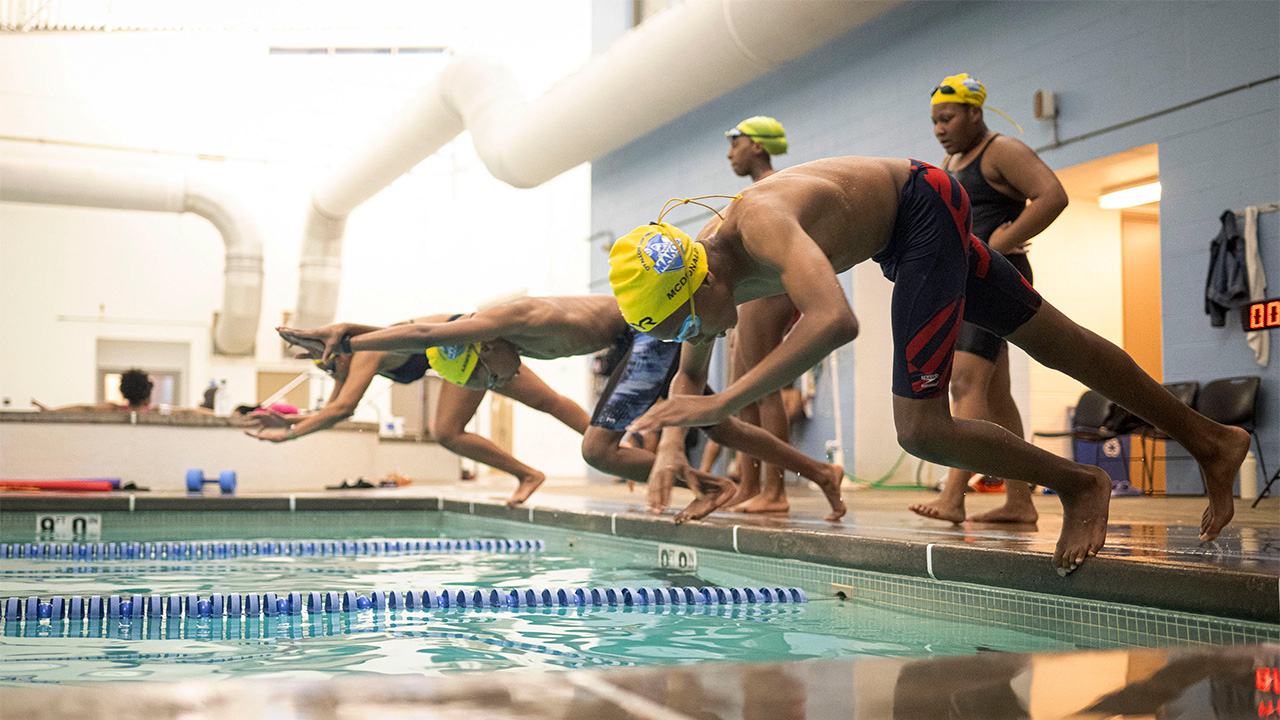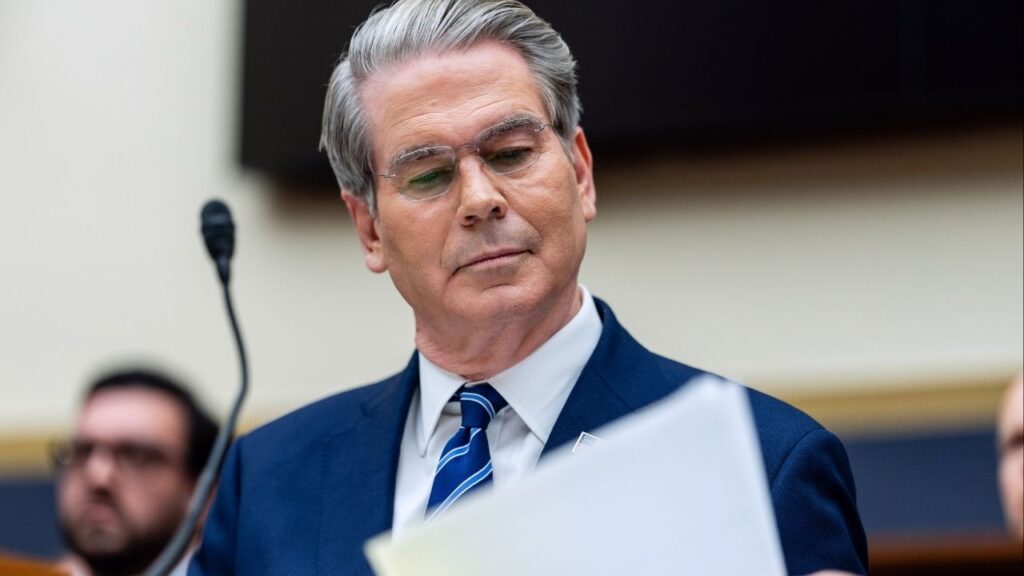A St. Louis swim team works to overcome historical barriers and teach water safety amid rising drowning rates, especially among Black children. (KFF Health News/Michael B. Thomas)

- A Missouri swim team encourages Black youth participation, addressing historical segregation in swimming.
- Parents of swimmers confront their own fears and learn to swim, breaking generational cycles.
- Funding challenges arise for programs aiming to reduce high drowning rates among Black Americans.
Share
At a swim meet just outside St. Louis, heads turned when a team of young swimmers walked through the rec center with their parents in tow.

Cara Anthony
KFF Health News
A supportive mom kept her eye on the clock while the Makos Swim Team athletes tucked their natural curls, braids, and locs into yellow swimming caps. In the bleachers, spectators whispered about the team’s presence at the pool in Centralia, Illinois — as they do at almost every competition.
“They don’t know that we’re listening,” Randella Randell, a swimmer’s mom, later said. “But we’re here to stay. We’re here to represent. We’re going to show you that Black kids know how to swim. We swim, too.”
Randell’s son, Elijah Gilliam, 14, is a member of the Makos’ competitive YMCA and USA Swimming program based in North St. Louis. Almost 40 athletes, ages 4 to 19, swim on the squad, which encourages Black and multiracial kids to participate in the sport. Coached by Terea Goodwin and Torrie Preciado, the team also spreads the word about water safety in their community.
“If we can get everybody to learn how to swim, just that little bit, it would save so many lives,” said Goodwin, a kitchen and bathroom designer by day who is known as Coach T at the pool. “Swimming is life.”
But just like mako sharks, such teams of Black swimmers are rare. Detroit has the Razor Aquatics, Howard University in Washington, D.C., has a team that’s made headlines for winning championships, and some alums from North Carolina A&T’s former swim team created a group to offer water safety classes.

Historical Barriers and Lingering Impact
In the past, Black Americans were barred from many public swimming pools. When racial segregation was officially banned, white Americans established private swim clubs that required members to pay a fee that wasn’t always affordable. As a result, swimming remained effectively segregated, and many Black Americans stayed away from pools.
The impact is still felt. More than a third of Black adults report they do not know how to swim, according to Centers for Disease Control and Prevention statistics, more than twice the rate for adults overall.
Seeing a need in their community, the parents of the Makos swimmers formed the Black Swimmers Alliance at the end of 2023 with a goal of “bridging the gap in aquatic skills,” according to its website. But the group, which offers swim lessons to families of color, is concerned about the flow of grant money dwindling because of the recent federal backlash against diversity, equity, and inclusion programs. Even so, they are fundraising directly on their own, because lives are being lost.
In late January, a 6-year-old died at a hotel pool in St. Louis. A boy the same age drowned while taking swim lessons at a St. Louis County pool in 2022. And across the river in Hamel, Illinois, a 3-year-old boy drowned in a backyard pool last summer.
Drowning is the leading cause of death for children ages 1 through 4, according to the CDC. Black children and Black adults drown far more often than their white peers.
Addressing Fear and History
Members of the Black Swimmers Alliance discussed those statistics before their advocacy work began. They also had to address another issue — many of the adult volunteers and parents with children on the Makos team didn’t know how to swim. Even though their children were swimming competitively, the fear of drowning and the repercussions of history had kept the parents out of the pool.
The Makos athletes also noticed that their parents were timid around water. That’s when their roles reversed. The children started to look out for the grown-ups.
Joseph Johnson, now 14, called out his mom, Connie Johnson, when she tried to give him a few tips about how to improve his performance.
“He was like, ‘Mom, you have no idea,’” the now-55-year-old recalled. “At first, I was offended, but he was absolutely right. I didn’t know how to swim.”
She signed up for lessons with Coach T.

Najma Nasiruddin-Crump and her husband, Joshua Crump, signed up, too. His daughter Kaia Collins-Crump, now 14, had told them she wanted to join the Makos team the first time she saw it. But among the three of them, no one knew how to swim.
Joshua Crump, 38, said he initially felt silly at the lessons, then started to get the hang of it.
“I don’t swim well enough to beat any of the children in a race,” he said with a chuckle.
Nasiruddin-Crump, 33, said she was terrified the first time she jumped in the deep end. “It is the only moment in my life outside of birthing my children that I’ve been afraid of something,” she said. “But once you do it, it’s freedom. It’s pure freedom.”
Mahoganny Richardson, whose daughter Ava is on the team, volunteered to teach more Makos parents how to swim.
She said the work starts outside the pool with a conversation about a person’s experiences with water. She has heard stories about adults who were pushed into pools, then told to sink or swim. Black women were often told to stay out of the water to maintain hairstyles that would swell if their hair got wet.


Bradlin Jacob-Simms, 47, decided to learn how to swim almost 20 years after her family survived Hurricane Katrina. She evacuated the day before the storm hit but said one of her friends survived only because that woman’s brother was able to swim to find help.
“If it wasn’t for him, they would have died,” she said, noting that hundreds did drown.
“That’s the reason why swimming is important to me,” she said. “A lot of times, us as African Americans, we shy away from it. It’s not really in our schools. It’s not really pushed.”
Makos swimmer Rocket McDonald, 13, encouraged his mom, Jamie McDonald, to get back into the water and stick with it. When she was a child, her parents had signed her up for swim lessons, but she never got the hang of it. Her dad was always leery of the water. McDonald didn’t understand why until she read about a race riot at a pool not far from where her dad grew up that happened after St. Louis desegregated public pools in 1949.

“It was a full-circle moment,” McDonald said. “It all makes sense now.”
Now, at 42, McDonald is learning to swim again.
Overcoming Challenges and Funding Concerns
Safety is always a priority for the Makos team. Coach T makes the athletes practice swimming in full clothing as a survival skill.
Years ago, as a lifeguard in Kansas City, Missouri, Coach T pulled dozens of children out of recreational swimming pools who were drowning. Most of them, she said, were Black children who came to cool off but didn’t know how to swim.
“I was literally jumping in daily, probably hourly, getting kids out of every section,” Goodwin said. After repeated rescues, too many to count, she decided to offer lessons.
Swim lessons can be costly. The Black Swimmers Alliance aimed to fund 1,000 free swim lessons by the end of 2025. It had already funded 150 lessons in St. Louis. But when the group looked for grants, the alliance scaled back its goal to 500 lessons, out of caution about what funding would be available.
It’s still committed to helping Black athletes swim competitively throughout their school years and in college.

Most of the time, the Makos swimmers practice in a YMCA pool that doesn’t have starting blocks. Backstroke flags are held in place with fishing wire, and the assistant coach’s husband, José Preciado, used his 3-D printer to make red, regulation 15-meter markers for the team. Once a week, parents drive the team to a different YMCA pool that has starting blocks. That pool is about 5 degrees warmer for its senior patrons’ comfort. Sometimes the young swimmers fuss about the heat, but practicing there helps them prepare for meets.
Parents said white officials have frequently disqualified Makos swimmers. So some of the team parents studied the rules of the sport, and eventually four became officials to diversify the ranks and ensure all swimmers are treated fairly. Still, parents said, that hasn’t stopped occasional racist comments from bystanders and other swimmers at meets.
“Some didn’t think we’d make it this far, not because of who we are but where we’re from,” Goodwin has taught the Makos swimmers to recite. “So we have to show them.”
And this spring, Richardson is offering lessons for Makos parents while their children practice.
“It’s not just about swimming,” Richardson said. “It’s about overcoming something that once felt impossible.”

About the Author
Cara Anthony, Midwest correspondent, joined KFF Health News in 2019 after serving as a multimedia reporter at the Belleville News-Democrat. A native of East St. Louis, Illinois, she previously worked at The Indianapolis Star, The Frederick (Maryland) News-Post, and the Daily Press (Newport News, Virginia). Cara won a 2021 Edward R. Murrow award for Excellence in Diversity, Equity and Inclusion reporting. Her reporting on gun violence earned a 2021 Salute to Excellence Award from the National Association of Black Journalists. She co-moderated USA Today Network events during the 2016 election, and her six-part Belleville News-Democrat series “Then I Knew,” about racism in America, was nominated in 2018 for an Emmy. She is a graduate of Tennessee State University.
KFF Health News is a national newsroom that produces in-depth journalism about health issues and is one of the core operating programs at KFF—an independent source of health policy research, polling, and journalism. Learn more about KFF.
Subscribe to KFF Health News’ free Morning Briefing.
This article first appeared on KFF Health News and is republished here under a Creative Commons license.![]()
RELATED TOPICS:
Categories

Bredefeld Responds to Arambula’s Letter on ICE, Immigration

Ferreira Completes His Halfpipe Set with Gold

















